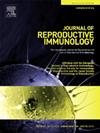The impact of thyroid function, autoimmunity, and subsets of Th cells in follicular fluid on ovarian reserve and embryo quality in assisted reproductive technology (ART)
IF 2.9
3区 医学
Q3 IMMUNOLOGY
引用次数: 0
Abstract
Both thyroid function and autoimmunity have the potential to influence fertility and pregnancy outcomes; however, the underlying mechanisms remain inadequately understood. The purpose of this study is to explore the effects of thyroid function, autoimmunity, and subsets of Th cells in follicular fluid on ovarian reserve and embryo quality. In this prospective cohort study, 104 patients were enrolled and divided into an observation group (TSH >2.5 μIU/mL or diagnosed hypothyroidism) and a control group, each with 52 patients. Follicular fluid samples from infertility treatments were analyzed for subsets of Th cells using flow cytometry, and thyroid function and autoimmunity in the fluid were measured. The ovarian reserve and embryo quality were evaluated. In the correlation analysis, it was observed that FT4, TSH, and TPOAb were significantly correlated in serum and follicular fluid (P < 0.05). However, no correlation was identified between subsets of Th cells and TPOAb in either serum or follicular fluid. In the multiple linear regression analysis, Th17/CD4+T lymphocytes demonstrated a statistically significant negative effect on the number of antral follicles (P = 0.021). Conversely, no significant effects were observed for thyroid function, TPOAb, or subsets of Th cells on the number of oocytes retrieved, fertilization rate, or the number of good-quality embryos.Our study indicates that Th17 cells present in follicular fluid may adversely affect ovarian reserve. Conversely, no significant effects were observed regarding thyroid function, TPOAb, or subsets of Th cells in follicular fluid on the quantity of oocytes retrieved, fertilization rates, or embryo quality.
辅助生殖技术中甲状腺功能、自身免疫和卵泡液Th细胞亚群对卵巢储备和胚胎质量的影响
甲状腺功能和自身免疫都有可能影响生育和妊娠结局;然而,潜在的机制仍然没有得到充分的了解。本研究旨在探讨甲状腺功能、自身免疫和卵泡液中Th细胞亚群对卵巢储备和胚胎质量的影响。在这项前瞻性队列研究中,104例患者入组,分为观察组(TSH >;2.5 μIU/mL或诊断为甲状腺功能减退)和对照组,各52例。使用流式细胞术分析不孕症治疗的卵泡液样本中的Th细胞亚群,并测量液体中的甲状腺功能和自身免疫。评价卵巢储备和胚胎质量。在相关分析中发现,血清和卵泡液中FT4、TSH、TPOAb呈显著相关(P <; 0.05)。然而,血清或卵泡液中Th细胞亚群与TPOAb之间未发现相关性。在多元线性回归分析中,Th17/CD4+T淋巴细胞对窦卵泡数量的负向影响有统计学意义(P = 0.021)。相反,没有观察到甲状腺功能、TPOAb或Th细胞亚群对获得的卵母细胞数量、受精率或优质胚胎数量的显著影响。我们的研究表明,存在于卵泡液中的Th17细胞可能对卵巢储备产生不利影响。相反,没有观察到甲状腺功能、TPOAb或卵泡液中Th细胞亚群对卵母细胞数量、受精率或胚胎质量的显著影响。
本文章由计算机程序翻译,如有差异,请以英文原文为准。
求助全文
约1分钟内获得全文
求助全文
来源期刊
CiteScore
6.30
自引率
5.90%
发文量
162
审稿时长
10.6 weeks
期刊介绍:
Affiliated with the European Society of Reproductive Immunology and with the International Society for Immunology of Reproduction
The aim of the Journal of Reproductive Immunology is to provide the critical forum for the dissemination of results from high quality research in all aspects of experimental, animal and clinical reproductive immunobiology.
This encompasses normal and pathological processes of:
* Male and Female Reproductive Tracts
* Gametogenesis and Embryogenesis
* Implantation and Placental Development
* Gestation and Parturition
* Mammary Gland and Lactation.

 求助内容:
求助内容: 应助结果提醒方式:
应助结果提醒方式:


